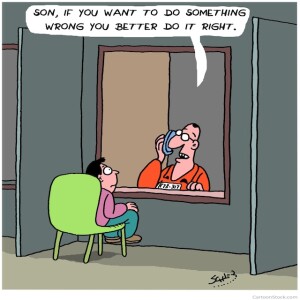
Sunday Dec 01, 2024
DO THE WRONG THING TO DO THE RIGHT THING… (part 2 of 2)
This week, I want to continue with my thought from last week and talk to you again about how sometimes you must do the wrong thing to do the right thing. As I said, this is a very difficult concept to wrestle with personally in some situations. This week I want to look at this topic in more depth.
Sometimes, the right choice isn’t immediately obvious and you are faced with making a decision that, at first appears wrong. Yet, deep down, you know that taking the road less travelled by other people can lead to a greater good and positive result that fits in more with your core beliefs.
Life often needs you to make challenging decisions, but you must always first think very carefully and logically about potential consequences and harm and not just act impulsively or emotionally. You find sometimes that doing the "wrong" thing is actually the most ‘right’ thing you can do.
The concept and implications associated with deviating from moral norms and standards, where the wrong thing becomes the right thing is very puzzling and applies to many scenarios in many different contexts.
Here are some counter-arguments based on examples I talked about last week:
- The idea of potential harm, as actions felt "right" based on their broader context, can still cause harm in the short term. For example, allowing a child to make mistakes may foster independence or resilience, but it can also result in unnecessary harm or distress.
- The idea of long-term consequences, especially in withdrawing from personal relationships, as decisions based on the idea that the wrong thing is the right thing to do, may have unintended and adverse long-term consequences for you or others.
- The idea of moral relativism, which is the idea that actions that are "wrong" can feel "right" in certain contexts, where a doctor lying to a patient about their medical condition may prevent immediate stress, but may lead to distrust or poorer health in the long run.
These ideas show the complexity of moral decision-making. You also have to be very careful of subjective bias and deciding what ‘right’ is, as what is felt ‘wrong’ be influenced by personal bias or interests. This subjectivity leads to justifying actions under the disguise of broader justification.
So, this week, remember how the ‘wrong’ thing sometimes becomes the ‘right’ thing. But remember also that context guides you when you make choices and you must always find a way to do things that ultimately gives you a deeper sense of rightness, even if it feels problematic!
No comments yet. Be the first to say something!